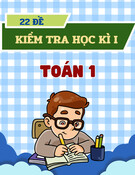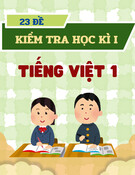
1
PRACTICE TEST 10
Mark the letter A, B, C, or D on your answer sheet to indicate the word that differs from the rest in
the position of the main stress in each of the following questions.
Question 1: A. curriculum B. discourteous C. category D. compulsory
Question 2: A. ancestor B. significance C. valuable D. ceremony
Question 3: A. generational B. communicative C. disobedient D. argumentative
Question 4: A. academic B. application C. kindergarten D. interruptive
Question 5: A. nervousness B. confidence C. creative D. feature
Mark the letter A, B, C, or D on your answer sheet to indicate the sentence that is closest in meaning
to each of the following questions.
Question 6: If I were in your shoe, I would let him go.
A. I suggest that you let him go.
B. I was wearing your shoe and would like to let him go.
C. I advise you to wear your shoe and let him go.
D. I would like to be in your shoe so he could let him go.
Question 7: “Why I haven’t thought of this before,” Dung said to himself.
A. Dung advised himself not to have thought of that before.
B. Dung suggested himself not thinking of that before.
C. Dung said that why he hadn’t thought of that before
D. Dung wondered why he hadn’t thought of that before.
Question 8: Strong as he is, he still can’t lift that box
A. He’s very strong, but he still can lift that box.
B. However strong he is, he still can’t lift that box.
C. He still can’t lift that box because he’s not as strong.
D. The box was too heavy for him to lift.
Question 9: So far as you’ve explained the problem, it doesn’t sound too bad.
A. The problem didn’t seem very bad until you’ve explained it.
B. The problem can’t be any worse than you’ve made it sound.
C. If you hadn’t explained it so well, the problem would seem worse.
D. The problem wouldn’t have sounded bad if you explained it.
Question 10: What he did came as no surprise to me.
A. He told me that he was not surprised. B. His behaviour surprised me.
C. I was not surprised by his actions. D. He was surprised when I came.
Question 11: The firemen were in time to save the people but not the house.
A. The house was saved but the people were lost.
B. The people were saved and so was the house.
C. Both the people and the house were lost in the fire.
D. The people were saved but the house was lost.
Question 12: The company turned down Hung’s offer
A. The company offered Hung a job. B. The company accepted Hung’s offer.
C. The company discussed Hung’s offer. D. The company rejected Hung’s offer.
Question 13: I found it difficult to communicate in English.
A. I didn’t like to communicate in English.
B. I preferred communicating in English.
C. I had no difficulty communicating in English.
D. I was not used to communicating in English.
Question 14: Nobody is allowed to enter the area without permission.
A. You can enter the area if you ask for permission.
B. You can’t enter the area under any circumstances.
C. You can’t enter the area without allowance.
D. You are not allowed to enter the area because of the permission.
Question 15: “I claim that you took my money,” she said to the housekeeper.
A. She insisted on the housekeeper taking her money.
B. She admitted the housekeeper having taken her money.

2
C. She warned the housekeeper against taking her money.
D. She accused the housekeeper of having taken her money.
Mark the letter A, B, C, or D on your answer sheet to show the underlined part that needs correction.
Question 16: Below are some pieces of advice that can help you reduce the feeling of
A B
pressure and creating a good impression on your interviewer.
C D
Question 17: What I love most about the book that was the close-knit friendship of the three friends.
A B C D
Question 18: No matter how young are you, you should take responsibility to do some
A B C
housework family to help your parents
D
Question 19: Irrigation often studied together with drainage, which is the natural or artificial
A B
removal of the surface and sub-surface water from a given area.
C D
Question 20: Studies of Mars indicate that enough water might be collected on the planet’s
A B C
surface sustain prolonged missions by human space crews
D
Read the following passage and mark the letter A, B, C, or D on your answer sheet to indicate the
correct answer to each of the questions from 21 to 30.
Why is it that flying to New York from London will leave you feeling less tired than flying to
London from New York? The answer may be a clear case of biology not being able to keep up with
technology.
Deep inside the brain there is a “clock” that governs every aspect of the body’s functioning:
sleep and wake cycles, levels of alertness, performance, mood, hormone levels, digestion, body
temperature and so on. It regulates all of these functions on a 24-hour basis and is called the circadian
clock (from the Latin, circa “about” + dies “day”).This body clock programmes us to be sleepy twice a
day, between 3-5 a.m and again between 3-5 p.m. Afternoon tea and siesta times are all cultural
responses to our natural biological sleepiness in the afternoon.
One of the major causes of the travelers’ malady known as jet lag is the non-alignment of a
person’s internal body clock with clocks in the external world. Crossing different time zones confuses
the circadian clock, which then has to adjust to the new time and patterns of light and activity. To make
matters more complex, not all internal body functions adjust at the same rate. So your sleep/wake may
adjust to a new time zone at one rate, while your temperature adjusts at a different pace. Your digestion
may be on a different schedule altogether.
Though we live in a 24-hour day, the natural tendency of the body clock is to extend our day
beyond 24 hours. It is contrary to our biological programming to shrink our day.
That is why traveling in a westward direction is more body-clock friendly than flying east. NASA
studies of long haul pilots showed that westward travel was associated with significantly better sleep
quantity and quality than eastward flights.
When flying west, you are “extending” your day, thus traveling in the natural direction of your
internal clock. Flying eastward will involve “shrinking” or reducing your day and is in direct
opposition to your internal clock’s natural tendency. One of the more common complaints of travelers
is that their sleep becomes disrupted. There are many reasons for this: Changing time zones and
schedules, changing light and activity levels, trying to sleep when your body clock is programmed to be
awake, disruption of the internal circadian clock and working longer hours
Sleep loss, jet lag and fatigue can seriously affect our ability to function well. Judgment and
decision-making can be reduced by 50%, attention by 75 percent, memory by 20 percent and
communication by 30 percent.

3
It is often suggested that you adjust your watch as soon as you board a plane, supposedly to try
to help you adjust to your destination’s schedule as soon as you arrive. But it can take the body clock
several days to several weeks to fully adjust to a new time zone.
Question 21: The main function of the body clock is to________
A. help us sleep. B. help us adapt to a 24-hour cycle.
C. regulate the body’s functions. D. govern all the body’s responses.
Question 22: The word “It” refers to________
A. the programme B. the body clock C. the function D. the brain
Question 23: Jet lag
A. makes our body clock operate badly B. causes our body clock to change
C. extends the hours of our body clock D. upsets our body’s rhythms
Question 24: The word “malady” is closest in meaning to________
A. feeling B. bore C. illness D. thought
Question 25: The direction you fly in________
A. extends or shrinks your body clock B. alters your body’s natural rhythms
C. helps you sleep better D. affects the degree of jet lag
Question 26: According to the article________
A. jet lag can affect different abilities differently.
B. flying seriously affects your judgment and decision-making.
C. travelers complain about the negative effects of flying.
D. various factors stop us sleeping when we fly.
Question 27: On the subject of avoiding jet lag the article________
A. suggests changing the time on your watch.
B. proposes gradually adjusting your body clock.
C. says there is nothing you can do.
D. makes no suggestions.
Question 28: According to the author, which of the following reasons disrupt travelers’ sleep?
A. Travelers try to sleep between 3-5 p.m.
B. Travelers’ attention is reduced by 75 percent.
C. Travelers fly in the natural direction of their internal clock.
D. The traveler’s internal circadian clock has to adjust to patterns of light and activity.
Question 29: It can be inferred from the passage that________
A. there are more travelers in westward flights than in eastward ones.
B. westward travelers become friendlier than eastward ones.
C. travelers have to spend more money flying westward than eastward.
D. travelers do not sleep as well in eastward flights as in westward ones.
Question 30: The word “fatigue” is closest in meaning to________
A. exhaustion B. obsession C. frustration D. sleeplessness
Read the following passage and mark the letter A, B, C, or D on your answer sheet to indicate the
correct word for each of the blanks from 31 to 40.
Human beings have a strong need to put their experiences and problems into words. That is why
everyone……31….... a “friendly ear”- someone who is ……32….... to listen to their troubles and joys.
But few people……33….... what a complex skill listening is. To be a good listener requires great
powers of concentration, which can only be gained through practice.
There are two reasons why listening is often such hard……34….... The first is simply that
people much prefer to speak. How often have you missed what someone has said because you were
thinking about what you were going to say……35…....? The second reason is that people speak too
slowly. The average speed is about 125 words per minute, ……36….... is not fast enough for the
human brain. It ……37….... too much time for the concentration to fail, as the brain tries to keep itself
busy with other, irrelevant thoughts.
Next time you are in a listening……38…...., try to predict what the speaker is going to say. Ask
yourself questions about what is being said, and ……39….... if the speaker answers them. Finally,
make quick summaries in your head of the main points that have been made. All of these things
will……40….... you concentrate and make you a better listener.

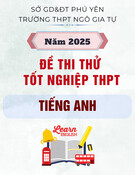


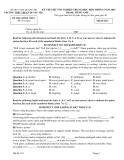
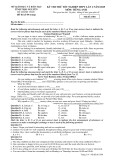
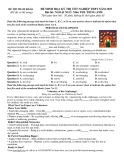
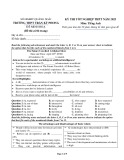
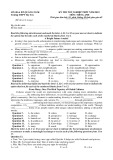
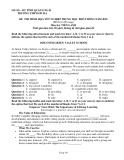
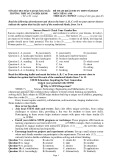





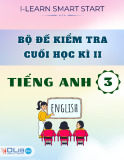


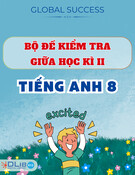
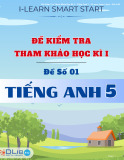

![Đề thi Tiếng Anh có đáp án [kèm lời giải chi tiết]](https://cdn.tailieu.vn/images/document/thumbnail/2025/20250810/duykpmg/135x160/64731754886819.jpg)
